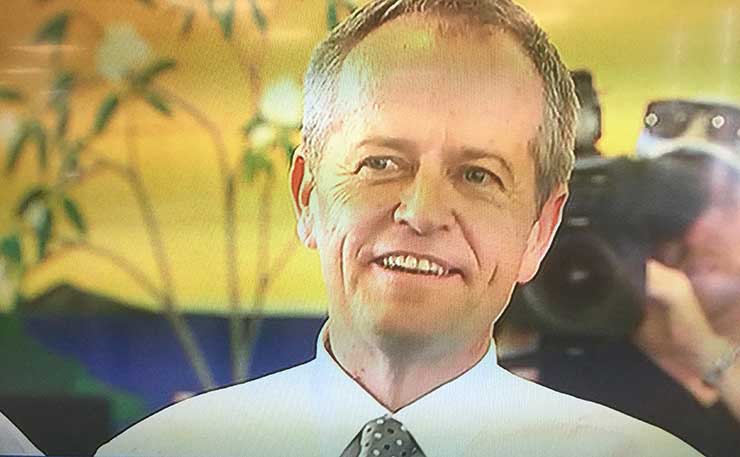The ALP’s ‘on-again off-again’ position on the Carmichael mega-mine is entirely consistent with the party’s recent history, writes Michael Brull*.
Lately, there has been increasing media coverage about Bill Shorten’s changing positions on the proposed Adani megamine in Queensland. The Liberals have spun this position as a total flip-flop, supporting the mine, then opposing it.
In fact, Shorten is so unprincipled, his supposed flip-flop has seen him going from saying that if the Adani mine “stacks up” he’ll support it, to now saying that if the mine doesn’t stack up he won’t support it. And he thinks it doesn’t – at this moment. But in both cases, he’s not committing either way. When he supposedly supported Adani, he said he’d welcome the jobs it would bring (if the project stacked up). Now that he supposedly opposes Adani, he promises he won’t tear up contracts, and otherwise do what he can to actually stop Adani.
Adani has welcomed Labor’s commitment.
Other ALP members have shown a similar unwillingness to just oppose Adani. Labor heavyweight and possible future leader Anthony Albanese got out to criticise calls for a Labor government to kill the project. He has previously responded to activists by saying “when will you people fuck off?”
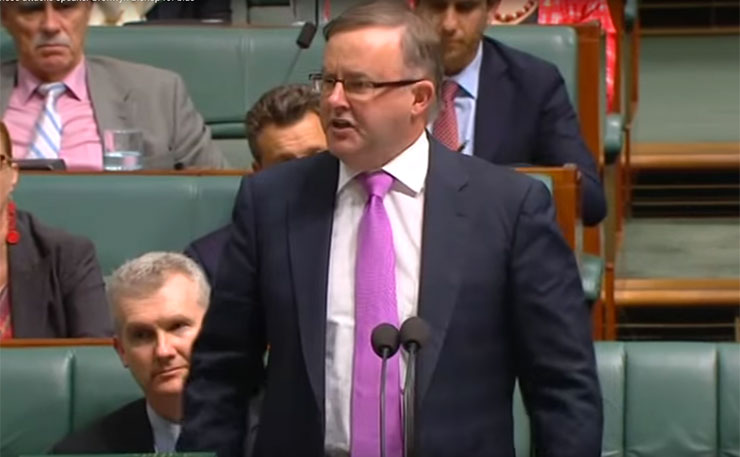
Stop Adani Sydney is presently on week four of picketing his office on Monday mornings. They note he voted against stopping Adani’s mine in August last year, and voted for changes to native title in June that helped Adani defeat challenges from traditional owners.
Tanya Plibersek, the noted sell-out and current deputy leader of the ALP, went on Q&A to defend Shorten’s ‘I-don’t-know-we’ll-see’ approach. She responded to the Green’s position by aggressively interrupting Senator Richard di Natale repeatedly, and slamming outright opposition to the project as “simplistic”.
Other ALP politicians have also gotten in on the act. They have disciplined Shorten, preventing him from taking a stronger position against Adani. Even Shorten’s waffling version of opposition has caused discontent, with two frontbenchers criticising Shorten to the media, saying Shorten has “lost the plot” and was “off the reservation”, against the party position.
It should be noted: the Adani megamine would be an utter catastrophe. If it is built, it will mean the end of Australian climate change policy. It would not only mean Australia couldn’t meet any meaningful cuts. It would mean we would dramatically expand our carbon footprint, and double our coal exports. It would use up to one-tenth of the entire world’s carbon budget. If Adani isn’t stopped, Australia will have failed to address climate change.
Why is the ALP so terrible on climate change? Why can’t they just oppose Adani?
There are some familiar arguments. Coal offers jobs, supports the economy and so on. But studies have repeatedly shown the supposed economic benefits of coal mining are thin and overstated.
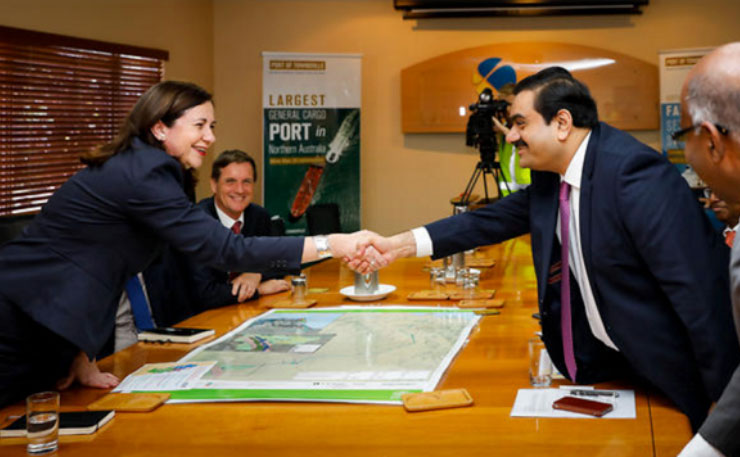
It does provide well-paid jobs, but it is a small part of the economy, declining from about 5 per cent of Australian GDP, to about 2 per cent, and still falling. The magnates and companies make an enormous amount of money, but they hardly pay taxes, amounting to a not very impressive 0.63 per cent of government revenue. And they receive staggering economic subsidies, estimates ranging between $9-12 billion. They take a lot from Australians, whilst giving to a few, and mostly enriching overseas financial elites, who own some 80 per cent of our mining industry. And they are destroying the planet.
In 2010, the government of Kevin Rudd wanted to impose a tax on the enormous profits coal companies were making. The super-rich elite, including coal barons like Andrew Forrest and Gina Rinehart, responded with an enormous advertising blitz against the government. It cost $22.2 million, with a greater war chest earmarked for a long fight. Rudd didn’t surrender to Big Coal’s campaign. But the ALP did. They threw him out, without the new government ever really explaining why they’d ousted the guy who had won the vote of most Australians.
The new Prime Minister Julia Gillard swiftly demonstrated her priorities. As noted in Big Coal, by David McKnight, Guy Pearse and Bob Burton, Gillard immediately capitulated.
From day one, “Gillard signalled that negotiating a peace deal with the mining industry was her highest priority”. The Minerals Council of Australia accepted victory, and suspended their ads. A new deal was worked out between Gillard’s government, Rio Tinto, BHP Billiton and Xstrata, but “Treasury officials were pointedly excluded from the negotiations.” Originally, the tax was expected to raise $10 billion a year.
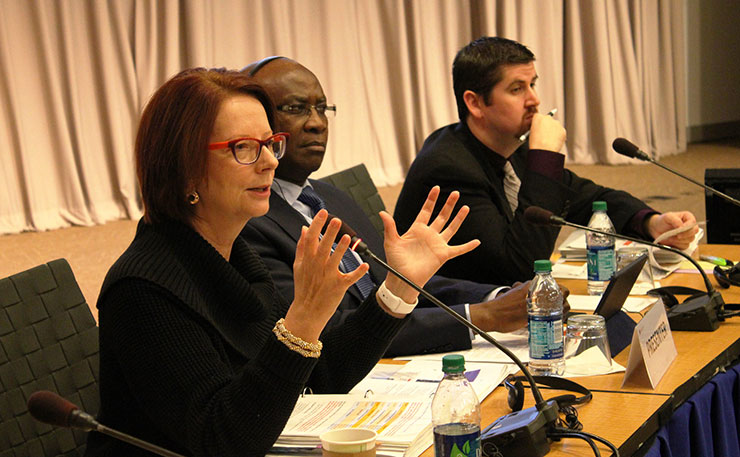
McKnight, Pearse and Burton note that the new Mineral Resources Rent Tax (MRRT) had “huge loopholes”. It yielded, “at best, a few hundred million dollars in the first year. Rio Tinto for one, paid nothing in the first year and may never”. This was a good return on their investment. Gillard later advanced a carbon tax, which gave the biggest polluters $5.5 billion. This was theoretically supposed to encourage them to reduce their emissions. As Fairfax reported, Gillard and “Wayne Swan placated the big three multinational miners by allowing them to design their own mining tax”.
This wasn’t the only time the Gillard government surrendered to Big Coal. As noted in Big Coal, in 2012, the government considered “axing the mining industry’s generous diesel fuel rebate. Once more, the [Mineral Council of Australia] launched an advertising campaign, and the next day the government capitulated”.
In 2013, when it was clear how little money had been gained from the MRRT, some Labor MPs suggested “tweaks” to the tax. Big Coal launched “another round of ads aimed at the government”. Again, the ALP government folded. The ALP under Gillard folded three times in the face of advertising campaigns against them by Big Coal.
Presumably, Big Coal was pleased at the happy arrival of a more malleable ALP government. Who constituted the more pro-coal faction of the ALP? Who gave Gillard the backing to oust Rudd? It was, and is, generally conceded that one of the major players was Bill Shorten, then widely identified as a “factional warlord” and “faceless man”. 10 days before the coup, he approached Gillard, it being understood he wanted her to take Rudd’s position.
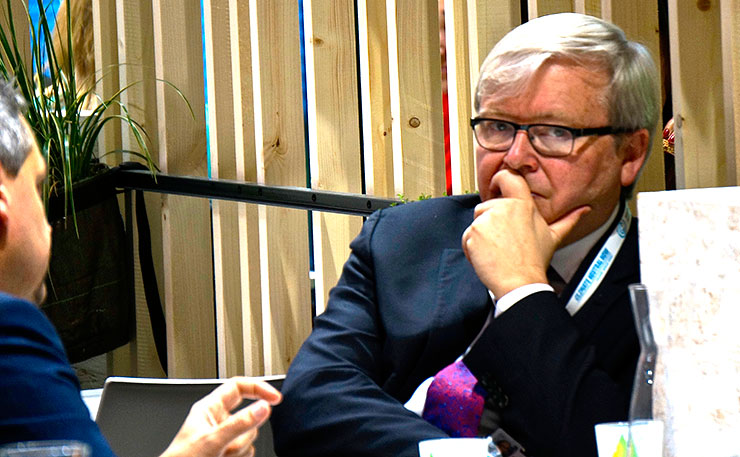
Shortly after the coup, Shorten went on Q&A, and explained why Rudd was ousted. He repeatedly referenced the mining tax. For example, he said “the way which we had introduced the debate about the mining tax – you couldn’t go anywhere without people – good people, people in your own electorate, saying to you, ‘Something has gone really wrong with what the government is doing’…” Sticking to this talking point, Shorten said again, “People were saying, ‘we could probably see why mining companies should pay more money, but you haven’t explained to us the detail of how it would work’. Again, “we certainly hadn’t explained it well and, in terms of implementation, we hadn’t sufficiently engaged with the business sector and so what was happening is that was crowding out all our other messages.”
This is part of the story of the ALP. Another part is Kevin Rudd’s strong backing for action on climate change. But then he back-flipped, and effectively destroyed his own credibility. Why? Journalists subsequently reported that Rudd abandoned his position under heavy pressure from his deputy and treasurer, Gillard and Swan.
One can go on. A former Resources Minister for the ALP went on to work for big coal, as did various staffers. Big coal uses these political connections to help it lobby ALP politicians, playing on already existing personal relationships.
In August 2010, Guy Pearse, former whistleblower and one of Australia’s leading experts on climate policy, observed that “Labor is as much a hostage to the coal industry as the Coalition, and the difference between the climate policies of the two major parties is negligible.” The biggest change between now and then isn’t improved Labor policy, but the Coalition drifting further and further to the right. Labor is still a hostage to the coal industry. And they can’t be trusted to stop Adani.
If Shorten ever does stop waffling, remember what happened last time the ALP took on Big Coal. Remember what happened when they tried to just get a fair cut of Big Coal’s profits.
When it came to picking sides in 2010, Shorten didn’t pick our side, and he didn’t pick the side of the planet.
* Michael Brull is a member of the Greens.
Donate To New Matilda
New Matilda is a small, independent media outlet. We survive through reader contributions, and never losing a lawsuit. If you got something from this article, giving something back helps us to continue speaking truth to power. Every little bit counts.

